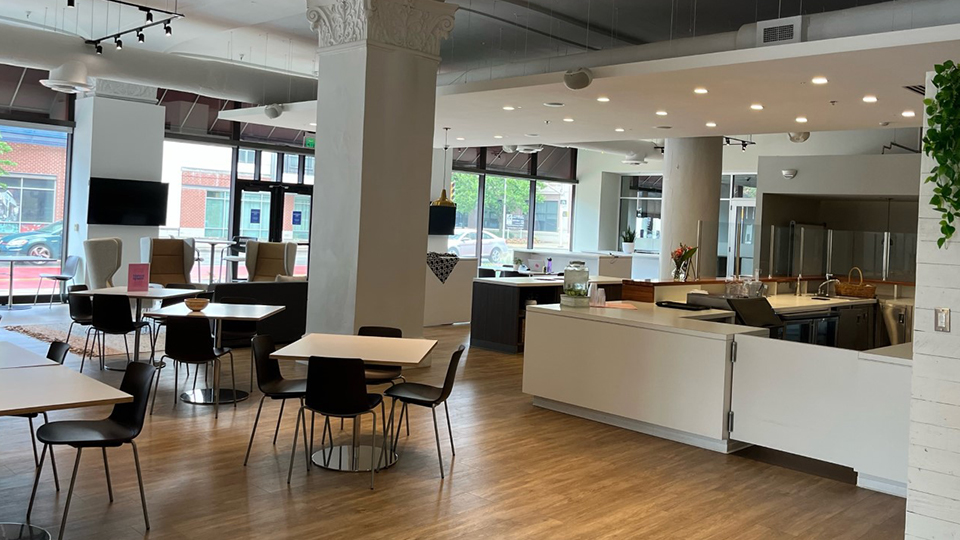Maven Space crowdfunding $100K for community expansion, upgrades
Subscriber Benefit
As a subscriber you can listen to articles at work, in the car, or while you work out. Subscribe Now
The co-founder of an Indianapolis female-dedicated coworking space is looking to raise $100,000 to upgrade and expand her business that she says breeds community and fills a crucial gap in the area.
Leslie Bailey, CEO and co-founder of both Maven Space and publication Indy Maven, knew this was something people wanted — she knew that much from her Indy Maven community. She also saw the success of upstarted spaces in other major cities. However, she knew starting a business as a woman was harder than her male counterparts.
Venture capital wasn’t worth the effort, she said, noting that women receive 2% of those dollars. Bailey needed to use her and her husband’s savings and a credit card to get her coworking space off the ground. She saw herself into two statistics: 46% of female entrepreneurs finance their startups with credit cards and 40% do so with their personal savings.
“If an average credit card interest rate is 21% and a woman has to go out and get a credit card, whereas a man didn’t, she’s now working 121% harder to do the same thing,” Bailey said.
A year after Maven Space’s inception, Bailey hopes to see the community step up and support her, the community and their mission through the IFundWomen crowdfunding campaign. It has raised $2,600 with 25 days left.
What is Maven Space?
It is a membership coworking space, event venue and social club located in the OneAmerica Gibson Building downtown. The space is female-focused to provide women a safe and welcoming professional community and domain. However, men are welcome to join or come as guests.
Since the location is community-focused, the workspace is open and has no private office spaces; there are rooms for private meetings and calls. The space, measured at 15,000 square feet, also features natural light, accessible parking, a podcast studio and specialty rooms for naps, tranquility and nursing mothers. Members can stop by from 6 a.m. to 6 p.m. Monday through Friday. Events are typically held afterward from 6 to 9 p.m.
“We have a lot more amenities than a typical coworking space,” Bailey said. “We’re really looking at the holistic person and what women need in a day, which is really multifaceted.”
Members, or business teams, can pay for a monthly or annual membership depending on the amount of access and amenities one wants. Day passes are also available at $25 daily or through a deal for 10 priced at $20.
Building a community
Since Bailey had to put most of her funds upfront to secure a lease and start the business, not much was left for marketing. But that meant the enthusiasm, support and draw to memberships was completely a grassroots effort. The retention rate is very high, she said, and people have a sense of attachment to the community once they join.
“It’s a bit of a hidden gem,” she said. “Once they find out about it, then they love it.”
They are tapping into the group of young college graduates and professionals significantly affected by the pandemic, who lost the opportunity for a social circle of local like-minded people. It also serves as a career-orientated setting for women to get out of the house and be productive in a growingly remote working world.
The community is welcoming to new members despite being established, Bailey said; joining is not going to be like the anxiety of the first day of school. They host member breakfasts and events, but she said the “magic” is in the smaller moments. By joining, the space has cultivated a network of support they can’t find elsewhere, Bailey said — a big selling point.
“Our biggest competitor is not another coworking space,” she said. “My biggest competitor is your kitchen.”
Several local institutions and figures, such as Mayor Joe Hogsett’s administration and Pass the Torch for Women, have also booked and used the space for events.
What’s next?
If the goal is met, Bailey and her team would look into the possibility of opening a second location. She also mentioned upgrades like adding a sign to the building, buying new AV and other technology and giving the place a cosmetic facelift. She also wants to continue a scholarship for a membership for an entrepreneur, student or not-for-profit team or leader who could benefit from using the space.
The goal, she admits is high, but has roots in what will be needed for the space’s long-term planning. The outreach will be similar to the space’s development — grassroots and personal outreach. Bailey said they also will look to businesses and stakeholders who have supported them previously.
Bailey picked IFundWomen as her crowdfunding platform for both its investment in women but also because they will keep the funds they raise. Several other crowdfunding platforms don’t do the same. They also can amend their goal, extend the time period and change donor rewards.
“Our entire community can benefit from women thriving. To me, this is something that our city should be invested in,” she said. “It’s something our state should be invested in — not just Maven Space, any women-owned business — because when we support women, amazing things happen.”
